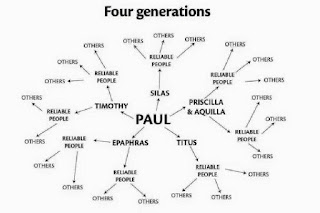There have been many errors and mistakes noted by scholars over the years. Most of them have been focused on theological differences. Yes, there is no doubt that heresy and unbalanced ideas have hurt the church. they continue to hurt us in many ways.
My focus is on the almost total lack of the churches after about 350 AD to obey the Last command of Jesus to "Go into all the world and make disciples." I know some of you will recognize this as a hobby horse of mine, but I must repeat it.
For the first 300 years or so Christianity grew by leaps and bounds. The first book of the Bible, I Corinthians, kept the original vision alive with God's people. It focuses on being alive in Christ fully embracing God's Word, Fruit and Gifts.
The new believers joined with older believers in house churches and ate together, prayed together, sang together and cared for each other. The church "Grew daily as the Disciples met together". (Acts 3)
There was persecution, resistance, poverty, spiritual attacks and many kinds of heretical ideas but still the churches grew in vitality as they worked hard to love each other, pray for each other and study God's word.
Historians record remarkable signs of new life as women were free to choose a mate, slaves were liberated and children left outdoors to die were brought into their homes. Open confession was practiced with every new believer. Many if not most had come from sin filled lives of lies, debauchery, crime, violence, domestic abuse, etc, that exomologesis or open confession was a necessity and very powerful with no gossip since everyone knew the real stories.
The result of such love and healthy lives attracted many to the ranks. The number of house churches grew dramatically since they had no other places to meet.
This was discipleship that followed and mimicked the Lord Jesus Christ. As a result, the faith prospered and grew. It was just as God had planned and taught through Jesus. "It is better that I go away because I will send the Holy Spirit who will be with you and in you..." (John 14 and 15)
Read my books here to understand this ancient approach.
Go here to support our disciple making process


No comments:
Post a Comment